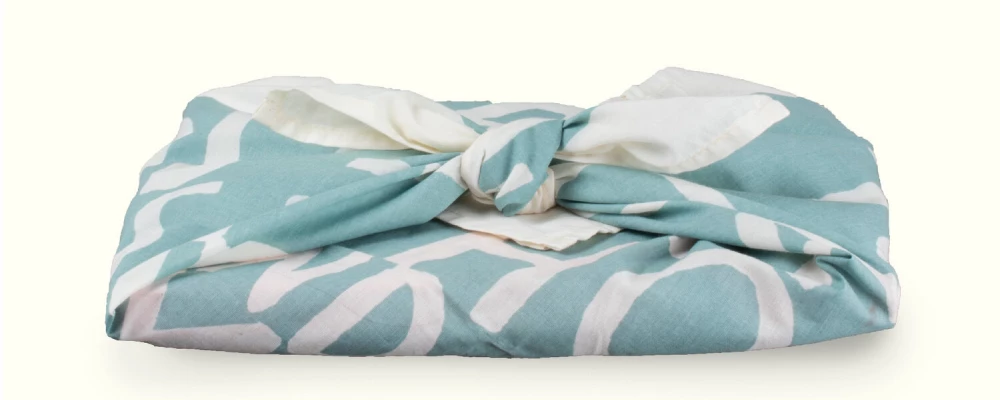
Why we should use reusable packaging - and inspiration to make your own
The benefit of reusables is obvious; you only need one of the thing and it should last you your lifetime, and then some. Though what you should swap to isn’t always clear. They can be a costly investment, and you likely need to change your habits to remember the new item exists. So how do we actually make the switch to using reusables, especially when only essentially a handful of retailers are on board?
We were asked for our thoughts on the question: "Are tote bags bad for the environment?" by the Metro newspaper, and so in this article we dive a little further into why we should be using reusable packaging for everything we purchase. We also consider what solutions fashion brands can be implementing to educate on the need for habit change and reduced waste.
Why use reusable packaging?
Buying into sustainability fulfils the shopping desire and alleviates guilt - and yet we all have something reusable in our life already (not least the giveaway cotton tote bags). Using what you have should come first.
When it comes to purchasing a reusable as a replacement to single use options, consider if you will enjoy switching your habit to use it. Even if you chose an organic cotton tote over conventional (non-organic) cotton, if you don’t like the bag and won’t use it every time, then what’s the point? The same with cups: they’re made of metal and plastic anyway so someone and some environment somewhere is paying the price.
It is evident that there is too much packaging waste; look at the street, dirty parks, beaches... even walking through the supermarket there are signs of overproduction. But, reusables need to be reusable, not just an additional thing we buy to feel good. So if we can't switch our habits, we can't change the system.
What can retailers do to improve reusable systems?
On top of your habit change, stores need to be on board with accepting your decision to use reusables, and our legislation needs to reward businesses who produce and accept reusables (this also goes for plastic free period products).
If you want to weigh up whether the reusable you want to purchase is better for people and planet or not, ask the company. If you have to search to find the information, then perhaps their values aren’t as ethical as they could be.
Remember, you can refuse that free branded bag to reuse and update what you have, though there are brands producing reusable cotton products regeneratively and with fair trade principles, so seek them out (e.g. re-wrap for Lush and Daunt Books).
What will the impact of using reusables be?
Overall, the action of you using a reusable will be a green light for someone else to do the same. Unfortunately there is still room for improvement within our systems and infrastructure, but each active citizen taking the step towards reducing and reusing will increase recognition of the situation: we just cannot keep producing unnecessary stuff and throwing it in the bin - there is no “away”, or a planet B.
There is of course the material reduction, and so imagine the entire supply chain and all the people and resources involved in creating one croissant bag, for instance. Yes there are associated emissions and impacts initially with that item, but by re-using one item, you are effectively saving money.
Brands: inspiration for your packaging
We have a full Masterclass on considerations for eco packaging for your sustainable fashion brand. In it we discuss options available to you as a brand when designing your shipping and customer-facing packaging.
Using recycled materials
There are arguments for recycled materials as the most sustainable, while others will argue for biodegradable bioplastics. The choice between recycled plastic, biomaterials and textile fabric will differ dependent on your product, along with your shipping lifespan, how the packaging it to be used by the customer, and if you offer a take-back scheme. EcoEnclose is one such company looking to improve the current packaging recycling system.
"There isn’t a perfect answer and different companies can disagree on what the most sustainable packaging solution is. That is fine. The important thing is that anyone selling or using sustainable packaging has taken the time to determine what that means for them, and why their solution is best for their company and the environment." ~ Saloni Doshi, Co-Owner EcoEnclose
Learn more about recycled packaging options here.
Using fabric as the packaging
A tote bag or hemmed fabric wrap is an environmentally-friendly option in comparison to a plastic bag as it has a longer lifespan for reuse, is made from a renewable resource and can biodegrade. Re-wrap are an example of a company who make high-quality cotton products that are so durable, they last for decades rather than years, helping to reduce the need for single-use plastic bags, and as a result, waste in general. They also support organic cotton farming and fair trade product manufacture.
"As a company, we value the longevity of our products and the sustainability of our supply chain. We feel that it is imperative for buyers to ask the important questions to their suppliers to ensure that goods are made in a way that is both responsible and ethical. We are very proud of our transparent supply chain and have full visibility of our production process from the farmers working on their cotton crops to the manufacturing of our goods." ~ Melissa Tatko, Head of Business Development for Re-wrap
Learn more about using fabric as an eco-packaging alternative to plastic here.
Using bioplastic and compostable packaging
The argument for using a biodegradable or compostable packaging is so that we are able to deal with the mounting waste, and avoid packaging heading directly to landfill after a single use. It is a material with greater effectivity for certain consumables like food or clothing received via an e-commerce customer - without perfect recycling systems in place, being able to home compost is an ideal scenario. Especially if the biomaterial can support soil health.
TIPA develops fully compostable flexible packaging, with fashion clients including Maggie Marilyn, and are looking at tackling the plastic crisis with a preventative solution to end conventional flexible plastic accumulation and waste.
Learn more about using compostable packaging, and how it composts, in this Lesson here.
Citizens: inspiration for making your own
Making your own reusable tote bag
There are so many bag patterns out there, and it depends on what style you're looking for, but have a quick search and you will come across something. We appreciate the Orton Bag from Merchant and Mills because you can make it in a multitude of fabrics, with scraps of textiles and trims, it is sizeable, and it's only £5 for the PDF pattern. The Spruce Crafts do a grocery-specific tote bag so it's designed to be heavy duty and all instructions are on the page.
What fabrics? Our dark blue fair trade selvedge denim offers the durability, versatility and cool character. For something with a slightly more grocery feel, try our chunky undyed basketweave organic cotton.
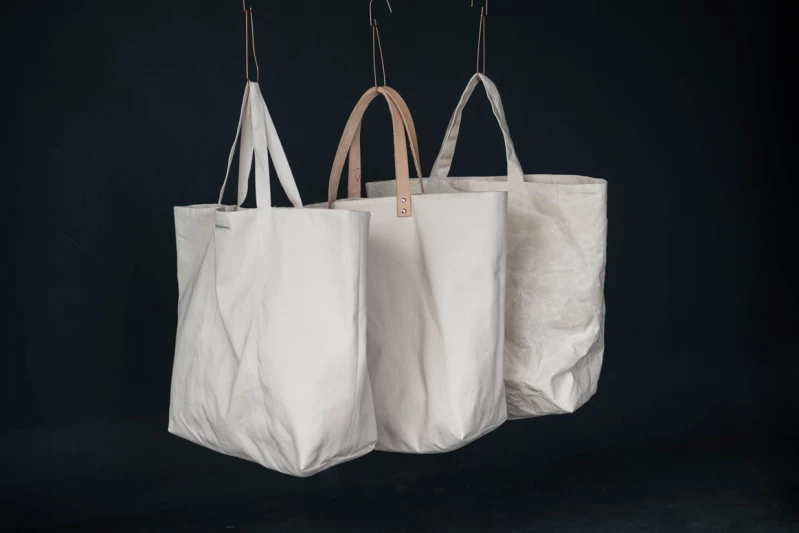
Making your own reusable furoshiki fabric wrap
Fabric wrap is suitable not only for gift-giving, but also wrapping sandwiches, fruit and the like. Furoshiki is the art of gift wrapping with fabric in beautiful knots and ties, but it isn't anything complicated. Simply take a square or rectangle of fabric, and wrap! You can make them look posh but double-roll hemming them like a napkin, pinking the edges or adding trim.
If you have some old curtains, scrap fabric or even unusable clothes, you could utilise them by over-dyeing, embellishing or printing on them. We love this easy video from English Stamp that shows you how to block print. We have hand-carved wooden stamps and eco printing ink so you can even have a go yourself with blockprinting your own fabric.
What fabrics? Knotted gift wrap work in all fabrics really, so raid your stash. We recommend our lightweight basketweave organic cotton because it takes plant dyes and prints incredibly well, and has a structure suitable for carrying food. Tencel™ satin would have a luxe vibe, and so could be used for wrapping presents and then repurposed as a handkerchief. And for something with texture that could double even as a hair wrap, go for handwoven cotton ikat with its super special pattern.
Making your own reusable cosmetic wipes and pads
A really cute way to use up the smallest of scraps - and especially older towels - is to make cosmetic face wipes, body scrubbers and make-up removal pads. All you need to do is cut out a piece of fabric, and either finish it by hand or machine with zig zag, overlock or a binding stitch. They make sweet gifts, especially if you put them together with low impact handmade toiletries (try Plastic Free Hackney's make-your-own low cost and low impact plastic free toiletries recipes).
What fabrics? So as mentioned, use what you have but consider how you would want the textile to feel on your skin. Maybe you want it smooth, maybe you want texture for exfoliation. You also ideally want to stay away from synthetics and anything dyed synthetically so that you're not rubbing that directly on your skin. Go for undyed or naturally dyed fabrics like our mediumweight organic cotton basketweave, or super soft milk jersey for a smooth handle.
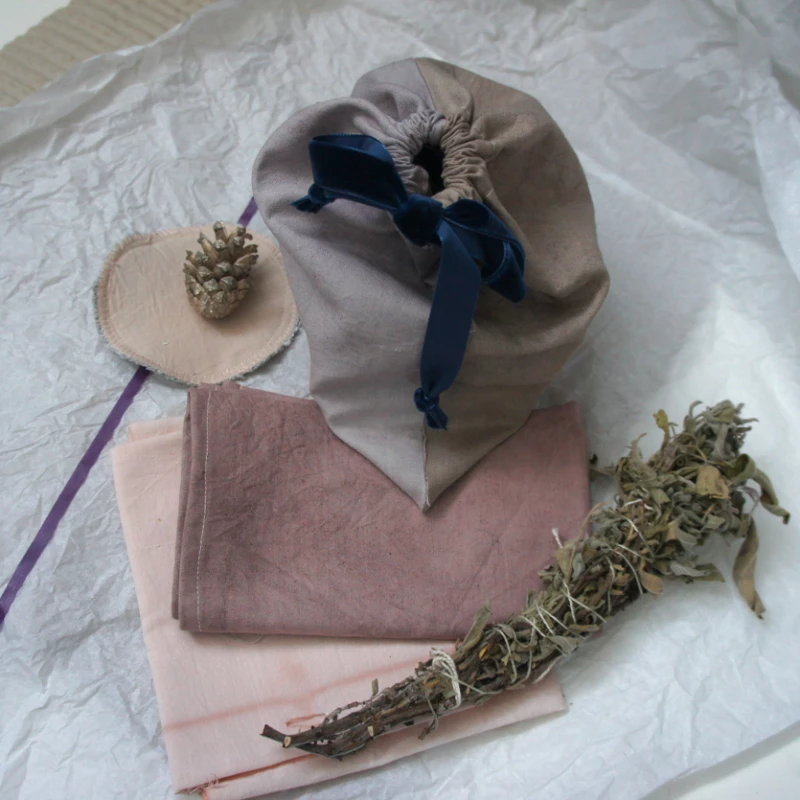
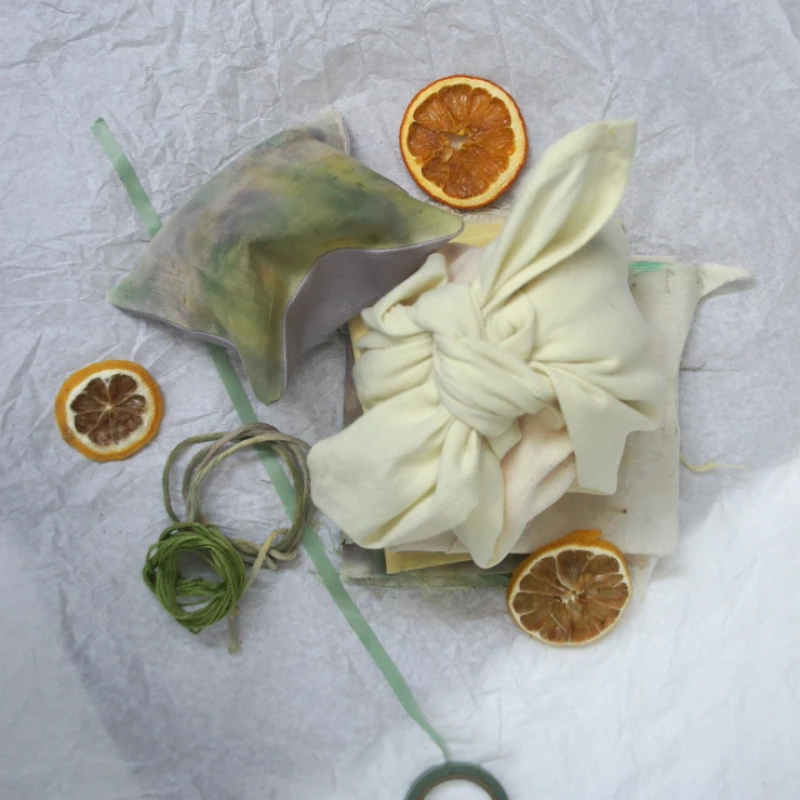
Making your own reusable period products
Made My Wardrobe - if you're a fan of period pants, then use the Josie Pants sewing pattern to create an absorbent period pant. Get the PDF extension with super instructional tutorial here.
What fabrics? Well the Made My Wardrobe team make up very cute kits with everything you need. But period pants work well when using small scraps of jersey fabric too. You could make a matching outifit with our wide organic cotton jerseys - t-shirts, shorts and pants all from just one metre!
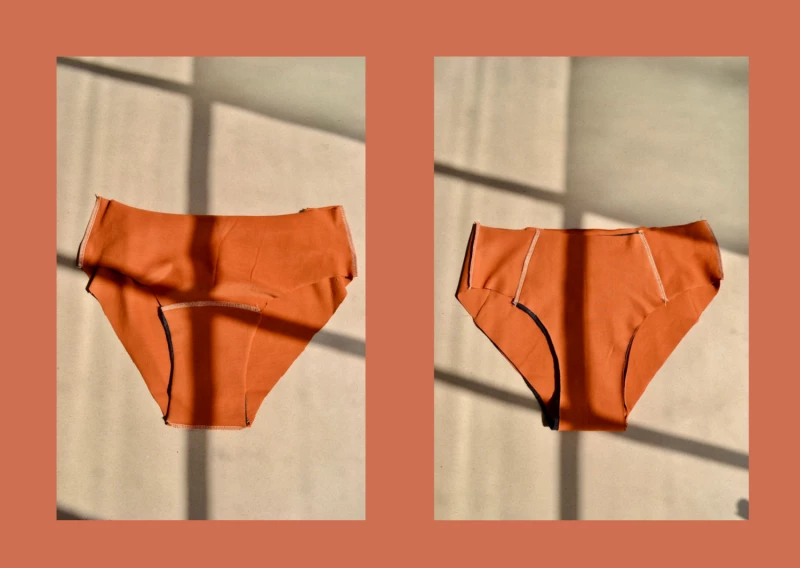
Purchasing ready made reusables
If you do not want to make your own (or don't feel you have the skills or have access to tools), then there are retailers who do create reusables with a bit more design to them than some throwaway merchandise. Or, ask a friend if they have a spare. We like:
Re-Wrap - get them via Lush, Daunt Books and Foyles.
Agnes LDN - organic essentials like face wipes and period pads. The grocery bags especially are great as they're very simple and so easily mendable too.
DAME - a well-developed and designed reusable period pad set. They come in a set of 3 sizes in a waterproof pouch. They do use synthetics, but this makes them dry quickly.
Get eco fabrics from our textile shop Offset Warehouse. Or to learn more about implementing responsible practices like reusable and low impact packaging systems for your fashion business, join The Sustainable Fashion Collective®.
